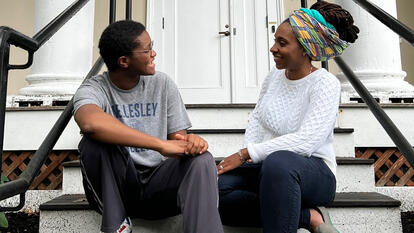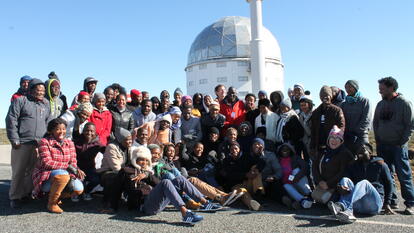Ethos Celebrates 50th Anniversary

In 1966, talking in a taxi after attending a conference for black college students at Columbia University, five Wellesley students determined that the College needed a student organization to support women of African descent. Their idea was the genesis of the group Ethos, which was officially established in 1968.
This weekend, the campus community joins Ethos in celebrating 50 years of culture, activism, and pride at its anniversary gathering, titled “Sankofa: Remembering Our Past, Planting Seeds for Our Future.” (Sankofa means “go back and get it” in the Twi language of Ghana.)
Festivities begin Friday and will include a movie screening, panel discussions, and welcome remarks from President Paula A. Johnson.
“This anniversary is a milestone of great significance for the Wellesley community—an opportunity to acknowledge the hard work, persistence, and resolve of our black students and alumnae who have built community and advanced diversity, inclusion, and equity on campus,” said President Johnson, in an email to the community. “It is a time to celebrate, reflect, and recommit to these values, which have anchored Ethos throughout the years and that have in turn shaped us all.”
Chirlane McCray ’76, the first lady of New York City, will deliver the keynote address on Sunday, April 8, at 10:45 am in Tishman Commons. The event is open to the Wellesley community. McCray created ThriveNYC, the most comprehensive mental health plan for the people of New York City. She also heads the Cities Thrive Coalition of mayors, which advocates for a more integrated and better-funded behavioral health system.
Tracey Cameron, assistant dean of intercultural education, advisor to students of African descent, and director of Harambee House, said Ethos helped engage Wellesley in the social and political discussions that were becoming prominent on campuses and were relevant to black students. “The student protest movement of the late 1960s and 1970s led by Ethos was an awakening for Wellesley College,” she said, citing the group’s essential input in the development of Harambee House and the Department of Africana Studies.
Cameron also said Ethos “provided a framework for student activism and leadership that has benefited not only students of African descent but the entire campus as a whole.”
Photo: Two members of the Ethos Choir in 1973.



